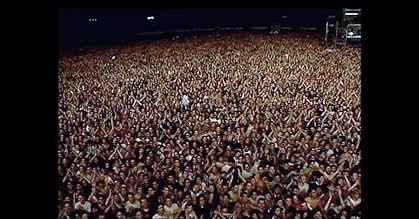Rompan Todo: L'histoire du rock en Amérique Latine
Original title: Break It All: The History of Rock in Latin America
IMDb RATING
7.6/10
1.4K
YOUR RATING
Soda Stereo, Café Tacvba, Aterciopelados and others feature in this 50-year history of Latin American rock through dictatorships, disasters and dissent.Soda Stereo, Café Tacvba, Aterciopelados and others feature in this 50-year history of Latin American rock through dictatorships, disasters and dissent.Soda Stereo, Café Tacvba, Aterciopelados and others feature in this 50-year history of Latin American rock through dictatorships, disasters and dissent.
Browse episodes
Featured reviews
It is likely that this docuseries's aim is to provide a glimpse, a primer on the history of Latin American rock, while also linking to the history of the region as well, rather than to create an absolutely comprehensive encyclopedia. To compare it to the great BBC series "The Seven Ages of Rock" would not be a stretch.
However, from the start it is clear that controversy will abound here as even the definition of "Latin America" for the purposes of the documentary is bound to cause polemic. Brazil is left out despite being the largest and most-populated country in the region, but this is a clever decision as it allows to keep the focus in Spanish-language rock (thus also leaving out a large number of United States and Canadian acts with members of Latin American origin or immigrants, but which mostly produce music in English).
This is also not a compendium of all rock in Spanish, as bands from Spain are only somewhat mentioned in tangents related to their influence on Latin America, specially in the 1980s, or projects with members that span both sides of the Atlantic (like Madrid-based Los Rodríguez, which included Argentinian members). In general, the main axes of the documentary seem to be Mexico and Argentina. A difficult decision but one that makes sense as these are both the historical (due its cultural and geographic closeness with the U.S., Mexico tends to be the gateway for many of that country's innovations to move south) and commercial axes of Latin rock itself.
In its successes, the series is exhaustive enough. Every major rock trend of the 20th century is well-represented and showcases general tendencies. Mexico favors blues- and folk-rock, Chilean rock has almost always had to fight repression of some sort, while in Colombia, the genre is generally a niche one and hardly tops the mainstream charts. The production is solid and a good balance is struck between archival footage and modern-day interviews.
On the other hand, its flaws are not tragic at any moment, but they could have been so easily addressed that it is likely that they will continue to be mentioned when the series is reviewed from now on. The edition is somewhat lacking, as some episodes will spend almost all their runtime focusing either on Mexico City or Buenos Aires, thus leaving out many important contemporary acts from the other countries/cities. These are often mentioned in the next episode, but by that point the momentum of showcasing all the acts as they related to their timeframe (early 1960s or 80s, for example) is normally lost.
The conclusion definitely feels rushed and is the weakest element of the series since, after being so comprehensive for the majority of the 20th century, it barely delves into the trends that defined rock in the early 21st century. Many movements were ridiculed shortly after they happened, like new wave and glam rock, but hindsight has vindicated them. While this might not yet be the case for pop-punk or emo, or even the peak hipster-ness associated with types of indie rock, if the series had chosen to showcase their Latin variants regardless, it would have been a step ahead of the curve and less likely to feel dated in a few years.
Particularly egregious are the complete lack of mention of movements like math and post rock, which had a very important and popular Mexico City representative in Austin TV, or the huge indie trends in both Mexico (Porter, Niña) and Chile (Pedropiedra, Ases Falsos). That these subgenres were skipped over in favor of the "after-rock" acts like Calle 13 and Nortec is probably the one true mistake of "Break it All", specially as they are widely considered to be part of the rock genre as a whole. That this could have been such an easy fix in dedicating the 6th episode to 21st century rock, and a 7th one to the possible future of the music, is frustrating but not to the degree of ruining the previous enjoyment.
However, from the start it is clear that controversy will abound here as even the definition of "Latin America" for the purposes of the documentary is bound to cause polemic. Brazil is left out despite being the largest and most-populated country in the region, but this is a clever decision as it allows to keep the focus in Spanish-language rock (thus also leaving out a large number of United States and Canadian acts with members of Latin American origin or immigrants, but which mostly produce music in English).
This is also not a compendium of all rock in Spanish, as bands from Spain are only somewhat mentioned in tangents related to their influence on Latin America, specially in the 1980s, or projects with members that span both sides of the Atlantic (like Madrid-based Los Rodríguez, which included Argentinian members). In general, the main axes of the documentary seem to be Mexico and Argentina. A difficult decision but one that makes sense as these are both the historical (due its cultural and geographic closeness with the U.S., Mexico tends to be the gateway for many of that country's innovations to move south) and commercial axes of Latin rock itself.
In its successes, the series is exhaustive enough. Every major rock trend of the 20th century is well-represented and showcases general tendencies. Mexico favors blues- and folk-rock, Chilean rock has almost always had to fight repression of some sort, while in Colombia, the genre is generally a niche one and hardly tops the mainstream charts. The production is solid and a good balance is struck between archival footage and modern-day interviews.
On the other hand, its flaws are not tragic at any moment, but they could have been so easily addressed that it is likely that they will continue to be mentioned when the series is reviewed from now on. The edition is somewhat lacking, as some episodes will spend almost all their runtime focusing either on Mexico City or Buenos Aires, thus leaving out many important contemporary acts from the other countries/cities. These are often mentioned in the next episode, but by that point the momentum of showcasing all the acts as they related to their timeframe (early 1960s or 80s, for example) is normally lost.
The conclusion definitely feels rushed and is the weakest element of the series since, after being so comprehensive for the majority of the 20th century, it barely delves into the trends that defined rock in the early 21st century. Many movements were ridiculed shortly after they happened, like new wave and glam rock, but hindsight has vindicated them. While this might not yet be the case for pop-punk or emo, or even the peak hipster-ness associated with types of indie rock, if the series had chosen to showcase their Latin variants regardless, it would have been a step ahead of the curve and less likely to feel dated in a few years.
Particularly egregious are the complete lack of mention of movements like math and post rock, which had a very important and popular Mexico City representative in Austin TV, or the huge indie trends in both Mexico (Porter, Niña) and Chile (Pedropiedra, Ases Falsos). That these subgenres were skipped over in favor of the "after-rock" acts like Calle 13 and Nortec is probably the one true mistake of "Break it All", specially as they are widely considered to be part of the rock genre as a whole. That this could have been such an easy fix in dedicating the 6th episode to 21st century rock, and a 7th one to the possible future of the music, is frustrating but not to the degree of ruining the previous enjoyment.
Loved it. Very touching. It summarizes amanzingly how Rock en tu Idioma came to be. Really liked the format, following the timeline. Nowadays, many like to tell stories playing with flashbacks, going back and forth. I am glad this was not the case as I could remember it all as I lived it. I found it fast paced tho'... or maybe I was just enjoying too much.
Totally biased my review because I'm latina and rocker so... Well, to put in context all of our latinamerican history of rock it's amazing because you can understand the whole message of the music and it's more powerful than what you've imagined. I think the people who like the latin rock, you have you watch this piece of art. I think that all the actors appear or are mentioned. It's really complete.
This documentary starts very well on the first and second chapter, after that is a monologue of producer Gustavo Santaolalla's version of RnR for latinamerca, completely biased by the documentary executive producer, yes you gess it correctly "the same santaolalla"
Awesome to see Netflix doing a doc about RnR in Latinamerica!! awful the final product! Don't waste your time as I did!
Awesome to see Netflix doing a doc about RnR in Latinamerica!! awful the final product! Don't waste your time as I did!
No es un documental completo, pasan por alto muchas bandas que sentaron las bases del rock en latinoamerica. Es la historia de los grupos producidos por Sanaolalla, pero no es la historia del rock en Latinoamerica.
Hablan de influencia española sin mencionar a Heroes del Silencio u Hombres G? No tiene sentido.
Bueno para perder un par de horas, pero no esperen mucho.
Details
- Release date
- Official site
- Language
- Also known as
- Break It All: The History of Rock in Latin America
- Production company
- See more company credits at IMDbPro
- Color
Contribute to this page
Suggest an edit or add missing content

Top Gap
By what name was Rompan Todo: L'histoire du rock en Amérique Latine (2020) officially released in India in Hindi?
Answer
![Watch Tráiler [OV]](https://m.media-amazon.com/images/M/MV5BMmMwNThjMzYtYmIwYi00ZDMzLWJkZjItZTRiNDQ3MjcyOGQ4XkEyXkFqcGdeQXRyYW5zY29kZS13b3JrZmxvdw@@._V1_QL75_UX500_CR0)




































